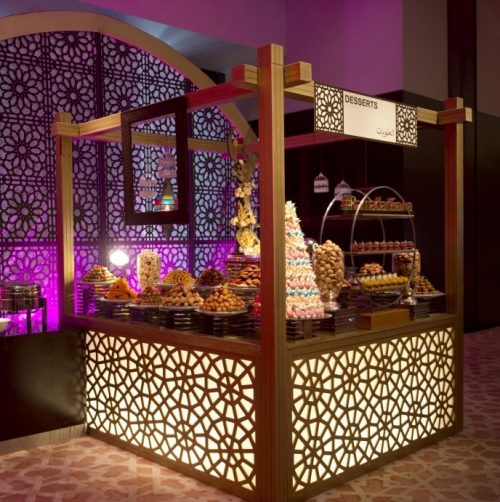While everyone enjoys the holy month of Ramadan, it can be a daunting period for F&B operations as daytime dining volumes reduce. Careful planning, thoughtful allocation of resources and budget control are the keys to success as Catering News discovers.

Ramadan is a time of peace and quiet as business and social events wind down providing a welcome break from the hustle and bustle of regular life. However, for the F&B industry in the Middle East, it can be a daunting period as volumes drop during daytime fasting hours, and opening hours are extended late into the evening, putting a strain on staffing and revenue. However, effective planning around budget and staffing is crucial to off-setting losses, and running a smooth and efficient Ramadan operation, according to chefs in the region.
Tom Aitkens, chef patron at Pots, Pans & Boards, Dubai comments: “Preparation, setting the right strategy, knowing your clientele and tweaking the offer is key to lowering the impact of reduced trading hours and the fasting period.”
For Bistro Des Arts co-founder Jonathan Vercoutere, the most challenging part of the planning process for Ramadan is organising staffing around unusual working hours. “We all know Ramadan can be a hard time of the year in terms of revenue… Staffing is the hardest part to manage during Ramadan as you accrue extra working hours for your staff and also three personal holidays during the Eid break,” he says, adding that the nocturnal operation also puts pressure on timetables. “Our busiest hours are mainly during the evening so we have to think ahead to reduce working hours before the event so that the impact isn’t too hard. It also means that we need to roster the minimum required amount of staff during the day operation so that all forces are focused on the evening.”
Four Seasons Resort Dubai at Jumeirah Beach director of food and beverage, Lorenzo Maraviglia agrees that staffing is a challenge during Ramadan, particularly if there are any hiccups or timetable clashes. However, staff at the hotel are well-prepared for working night-time hours, and some extra manpower is brought in to help with iftar and suhoor from evening venue Mercury Lounge, which is closed during Ramadan.

“Many of our staff are more comfortable with the night shift anyway, so the transition is not a large one,” he says. “Mercury is closed during Ramadan but the staff are trained for banqueting too so they come in to help with the added pressure in the tent and are accustomed to night shifts.” Four Seasons is also careful to ensure that management take centre stage so that iftar and suhoor operate efficiently with reduced staff numbers. “We centralise our core efforts,” says Maraviglia. “This ensures that leadership is readily available and that we can ease off operations in other outlets.”
Pinnacle Group, which operates Lebanese concepts, Leila restaurant and KrisKros Lebanon in Dubai, among other brands, has a range of mall and standalone locations, and makes sure that the most productive staff are allocated to the busiest locations during Ramadan. Managing partner of the group, Ahmed Al Alami comments: “During Ramadan the mall tends to get busier and standalone locations slow down so we do internal transfers and send very qualified staff who are productive and efficient to the mall locations.” Additionally, those staff who observe Ramadan’s fasting hours are given the leeway to take time off, or work reduced hours. “We send those who observe and fast to their home towns to enjoy the serenity of the holy month,” Alami adds.
At The Address Dubai Marina, fasting and non-fasting staff are balanced out on the rota to ensure efficiency doesn’t suffer. “I try to be patient and flexible with my team as I understand that it’s not easy to have a completely new system where my Muslim team fast the whole day from sunrise to sunset, because it lowers their productivity and effectiveness,” says Avinash Mohan, executive chef. “I plan my operations well in advance and try to balance the shift between Muslim and non-Muslim staff who can be supportive to each other.”

In addition to planning staff rotas around Ramadan’s unusual dining hours, budgeting effectively is a key concern for every F&B outlet in the region. At Four Seasons, the budget is laid out to ensure that a larger portion of the revenue is required from the evening operation. “We have a structured plan in place to ensure that both staffing and revenue are more than possible,” says Maraviglia.
Bistro Des Arts’ Vercoutere agrees that managing your own expectations as a business is very important during Ramadan. He comments: “Our budget is built accordingly so anything over that budget is positive. Any revenue lost during [fasting hours] means we have to work harder to make up for it at other times, but the best way is to have realistic goals so that you don’t have to worry about making up for it later on.”

Some businesses also implement additional revenue-generating initiatives to offset the negative impact of fasting hours on business volumes. Ivan Haller, director of food and beverage at Yas Viceory, Abu Dhabi comments: “We do generate less revenue [during Ramadan] but we work a lot with our neighbours and community by offering cooking classes for adults and children and we have special lunch offers and a wallet-friendly high tea served throughout the month.”
Takeaway and delivery options can also boost profits during the holy month, however licensing must be secured in order to do this, Pinnacle Group’s Alami points out. “We work on attaining permits from the Department of Economic Development in Dubai to deliver during the day,” he says.
Retro Feasts, Dubai has started working with delivery service, Deliveroo ahead of Ramadan to cater to nearby offices and residents to help boost revenue. Luke Thomas, chef patron of the venue also sees Ramadan as a chance to target new markets and experiment with new menu offerings. He comments: “Ramadan is an opportunity to explore different avenues with the change in opening hours. Where breakfast and lunch would normally be a more popular option for The Beach, we have revised our offerings and invite customers to try us. Due to our location we have a lot of tourists during normal operational hours and during Ramadan we get to appeal to a different demographic.”
And while non-licensed venues don’t see much change in terms of average spend per head during Ramadan, those that serve alcohol take a hit with reduced beverage sales. “Average spend obviously decreases since alcohol serving only starts after 8pm,” comments Bistro Des Arts’ Vercoutere. That said, Maraviglia of Four Seasons claims that other aspects of the business offset this challenge. “The spend on beverage does decrease, however this is made up for with in-room dining and shisha revenue that accumulates on a larger scale,” he says.
Another potential area for losses during Ramadan is food waste generated by iftar buffets, however many restaurants have become more sophisticated in recent years to reduce the impact of this. Generally, iftars have to be booked in advance, and many operations have started to opt for live cooking stations and refilling buffets throughout the evening based on demand, rather than over-catering at the start of the event.

Mohan of The Address Dubai Marina comments: “Wastage is well controlled as we get cover numbers for iftar so far in advance and we plan according to bookings. Also, we try to keep portions smaller and refill when required to avoid unnecessary waste. Our iftar is based on live cooking stations to provide freshly cooked food and avoid waste so nothing goes in the bin.”
Some restaurants, such as Pierchic, avoid wastage altogether by sticking to their à la carte menus instead of offering iftar and suhoor buffets. Julian Biddulph, general manager of the over-water restaurant comments: “Being based within a restaurant rather than a banqueting operation, we minimise waste by creating everything fresh to order. We don’t have a buffet selection; instead we maintain our standards.”
Pinnacle Group allows guests to take home leftovers to reduce waste and also shares excess stock among staff, according to Alami. The company works on a “par” level based on previous Ramadan operational results to plan carefully for what is needed. “During the first week of Ramadan we are aware that observers tend to spend quality time with family and friends and enjoy the family setting so we lower our par level and always have a tolerance of an extra five to 10% in case we have walk-ins,” says Alami.
And so, while reduced revenues and staffing issues during Ramadan are a serious challenge, careful planning, value-added activities, and creative marketing can help to offset losses to ensure the holy month is a peaceful time for everyone – even for those in the restaurant business.
“We make sure that the collective work throughout the month of Ramadan is achievable, efficient, and above all – obtainable,” concludes Four Seasons’ Maraviglia.


































































